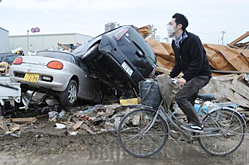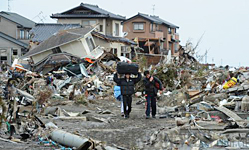|
 |
 |
|
POST-QUAKE WOES: A man cycles past cars tossed about by the earthquake and tsunami in Natori, Miyagi Prefecture, on March 14 (XINHUA/AFP) |
RETRIEVING BELONGINGS: Residents carry items recovered from the disaster in Natori, Miyagi Prefecture, on March 14 (XINHUA/AFP) |
"Popularization of the BCM made a great difference in the latest earthquake," said Masahiro Kaishi, General Manager of InterRisk Consulting (Shanghai) Co. Ltd.
He said the BCM can answer questions like what an organization should do after an earthquake, what is the priority when an earthquake happens, and what kind of supplies should be prepared beforehand.
"We cannot predict or resist natural disasters. But it is possible for us to discuss how to implement post-disaster reconstruction and make workable plans," he said.
Economic resilience
The earthquake, tsunami and ongoing radiation leaks have caused huge economic losses in Japan. The most pessimistic estimate has been that the disaster could cost up to 20 percent of Japan's total GDP. In addition, foreign investors are worried about radiation leaks.
But observers believe although the Japanese economy has temporarily capsized, it will not sink.
"People should not underestimate Japan's economic strength and its self-healing ability," said Feng of the CASS. He predicted the country's GDP growth would decline in the next six months, due to damage to businesses and transportation infrastructure. However, by 2012 or 2013, Japan's GDP growth will accelerate with reconstruction.
"Japan is a mature economy, and its GDP growth rate was pretty high among developed countries before the earthquake," said Feng. "It is impractical to expect Japan's GDP to have a rocketing growth rate, as in the 1950s and 1960s, after the earthquake. But the country can revitalize its economy."
He noted post-earthquake reconstruction would provide opportunities for many domestic enterprises. Plus, the country's unemployment rate will greatly decrease. Some Japanese enterprises have resumed production in the immediate aftermath of the disaster.
Sun Lijian, Deputy Dean of the School of Economics at the Shanghai-based Fudan University, said Japan's economy would not sink, due to the country's solid economic foundation.
Although economic losses are huge, its impact on Japan's processing industry and exporters would not exceed the negative impact of the 1995 Kobe earthquake, he said. Japan's processing industry and export-oriented enterprises are now mainly concentrated in the Tokyo-Yokohama industrial zone, Kobe and Kyushu. Although Japan has tried to accelerate the pace of industrial modernization in the northeast, the earthquake-hit region's economic contribution to the country was still not as large as many other regions.
It took Japan only six months to rebuild Kobe's production capacity after the earthquake in 1995, and two years for the country's economy to recover, which was much better than expected, Sun said. He pointed out the country's domestic economic risks are reduced, since Japanese companies are highly internationalized. If the nuclear pollution stopped deteriorating, it wouldn't take too much time for Japan to recover, he said.
| 